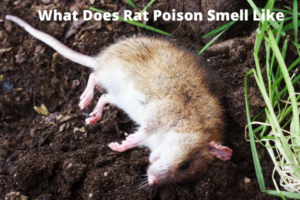Atap Exterminators are the best rat exterminator in Chicago. For more information, call .
When rats consume poison containing zinc phosphide, it reacts with stomach acid to form phosphine gas. Phosphine has garlic or a fishy odor, although it can be detected in the air even if it is not smelled. Additionally, individuals inquire about the odor of rat bait.
Due to the phosphine generated during hydrolysis, the baits have a strong, pungent garlic-like odor. The odor attracts (or does not repel) rodents but repels other mammals. Additionally, is rat poison palatable?
Rat poison is available in pellets or cakes. Because rat poison frequently smells and tastes like food, it may be appealing to children and pets.

How Do Rats Smell?
Mice have a musty, urine-like odor, while rats smell like ammonia. According to legend, roaches have an “oily” odor similar to “fecal soy sauce.” Rats and mice like to conceal themselves beneath floorboards or behind walls. You may frequently hear scratching, nibbling, squeaking, or scurrying on the walls. You can check out for best rat exterminator.
Do Poisoned Rats Suffer
Because of their toxic effects, including difficulty breathing, weakness, vomiting, bleeding gums, convulsions, abdominal swelling, and agony, additionally, the poisoned rodent’s carcass may be at risk if consumed by other animals, including native species.
What Poison Instantly Kills Rats
Bromadiolone is a rat and mouse poison. Bromadiolone and other anticoagulants act by stopping the blood from clotting. Unlike several other rat poisons, bromadiolone can be deadly after only one day of feeding.
Where Do Mice Spend their Days
Mice are nocturnal species, which means they are most active during the hours of twilight and dawn. Although mice dislike bright lights, they may occasionally be observed during the day, particularly if their nest has been disturbed or if they are in search of food. Keeping mice throughout the day can potentially suggest a significant infestation in a property.
Is Rat Poison Inhumane
Raptors, owls, coyotes, dogs, and cats who consume a poisoned rat are also poisoned. While this method of killing rats without concern of secondary poisoning may be efficient, it appears to be a ruthless method of killing because the rodents experience a slow, agonizing death.
How Many rats am I Now Harboring In My Home?
Droppings; Rodent droppings are solid evidence of the presence of rats or mice and will show the type of rodent, the extent of the infestation, and their preferred habitat—the odor of Urine. The Urine of rodents has a distinct musky scent. Holes that have been gnawed, rub marks runways, nests, noises, animal behavior.
Do Rats Consume Humans
Food: Rats will consume anything human drinks, and then some. Their Urine and excrement, which are left behind on uneaten food, have a more detrimental effect.
Rat Poison Smell Like
As the seasons change and the temperatures drop, small rodents such as mice and rats seek refuge in garages, sheds, and homes. To stave against these less-than-desirable intruders, many individuals choose rodenticides (i.e., rodent killers). It’s essential for you to know what does rat poison smell like.
However, these products are intended to kill small wildlife and cause serious injury to your pet. Here are five facts regarding rat poisons that every pet owner should know.
#1: Rat Poisons are Flavored
“Why on earth would my pet consume mouse or rat poison?” you may ask. Indeed, for the same reason that a bit of rat may consume it—its appealing flavor. Rat poisons come in various tastes, including peanut butter, and are designed to entice rats with their enticing fragrance. Once the animal consumes the product, the poison’s particular effects begin. While dogs are more likely to succumb to the alluring flavor, cats and other domestic animals occasionally consume these dangerous chemicals.
#2: A Variety of Rat Poisons are Available
Each rodenticide kind has a unique method of action. The majority of rat poison ingestion cases are dose-dependent, meaning the harmful consequences are proportional to the amount of poison consumed by the animal.
In most cases, clinical indications associated with this toxin take around three to five days to manifest. Lethargy or resistance to exercise are possible symptoms, as are pale gums, coughing or vomiting (with or without blood), nose bleeds, skin swellings, bleeding gums, or collapse.
Cholecalciferol (vitamin D3) – These toxins cause calcium and phosphorus deficiency. Excessive amounts of these minerals in the body might result in severe and acute renal failure. Increased drinking and urination, unpleasant “uremic” breath, weakness, and collapse are indicators of an overdose. Symptoms typically manifest two to three days after the poisoning.
Bromethalin: If toxicity is suspected with this poison, which causes brain swelling, you may notice indicators such as incoordination, tremors or seizures, or paralysis. Cats are more vulnerable to bromethalin’s effects than dogs.
Zinc and aluminum phosphates: While these poisons are more frequently employed in gopher or mole baits, some rodent baits contain them. These items are particularly harmful because they release a poisonous gas called phosphine in the stomach. When a sick pet vomits, the toxic gas might be inhaled by other pets and people, causing lung irritation or other symptoms.
#3: Some Poisons Are More Challenging to Treat- How Does Rat Poison Work
Pets who are affected will require treatment for around 30 days. Vitamin D3 toxicity is more challenging to cure, requiring hospitalization and extensive intravenous fluid therapy in most cases. Pets that consume bromethalin poisons may require hospitalization and a series of activated charcoal treatments to bind the toxin in the body. Antiacid treatment, forced vomiting, and potentially gastric lavage are required for phosphate toxicity.
#4: It is Critical to Determine the Sort of Toxin Consumed by Your Pet
Treatment for rodenticide ingestion is very dependent on the active chemical in the poison, and your veterinarian will want this information while treating your pet. If you have access to the rodenticide packaging or are aware of the sort of poison consumed by your pet, bring it to the veterinary hospital with you. Bear in mind that many toxins have similar names—for example, bromethalin and brodifacoum, the active ingredient in a LAAC.
Can You Die From Smelling Rat Poison
Strychnine’s Use
Strychnine, a lethal toxin derived from the strychnine tree, was one of the first widely used rodenticides. It can exterminate rats and other pests in less than an hour. Strychnine is commonly referred to as a first-generation vermicide. Following World War II, pest control developers recognized the potential of anticoagulants.
Because these potent medications block blood coagulation, rats who consume them die within a few days of internal bleeding. Occasionally, first-generation poisons are combined with second-generation anticoagulants to create a fatal toxin that acts rapidly and efficiently. Why would it be a bad idea to use rat poison to solve your pest problems?
Effective Pest Control Through the Use of Behaviors
Reading rat data can explain their behavior and why poisons may fail to act. To begin, poisoning rats is impossible unless they are duped into eating them. Pest control producers spent years developing creative ruses for the toxin, including strychnine-laced peanuts and infused grain.
Due to rats’ inability to vomit, they have acquired a strong aversion to any novel meal. They frequently avoid poisoned bait as a result of fear. Rats may be wary of an appeal that has been left out in the open and will prevent it. However, these intelligent critters are also interested and frequently take the bait to determine it. The rats may disregard it and continue nibbling on your pantry’s contents if you apply poison. If rats have a known food supply, they are less inclined to experiment with an unknown one.
The Potential For Rotting Carcasses Within The Walls
Another consideration is the disposal of the deceased rats, which poses its own set of hazards. When rats are poisoned, they will occasionally walk out into the open in search of water, as they are pretty dehydrated. They are frequently unable to exit their lairs and perish within walls or other inaccessible areas. Few smells are as awful as the carcass of a dead rat. If you use poison and the vermin die in an area that is inaccessible to you, you and your family will be bothered by foul scents for days.
